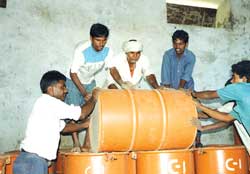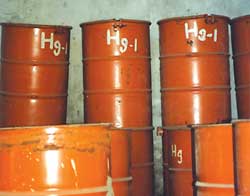 Chemical pesticides helped eradicate malaria from the inner tarai valleys in the 1960s and helped boost Nepal's agricultural productivity.
Chemical pesticides helped eradicate malaria from the inner tarai valleys in the 1960s and helped boost Nepal's agricultural productivity. At a time when there wasn't much awareness of the longterm environmental dangers these chemicals posed, the government, impressed by what the pesticides could do, imported more than it could use.
Between 1989-1993 alone 114 tons of pesticides were disposed of secretly: just poured into the ground or rivers. When news of this leaked out, environmentalists and journalists started protesting. A plan to incinerate the pesticides in the Hetauda cement factory kiln was also halted.
There are still 74.16 tons of expired pesticides lying in warehouses in Kathmandu, Nepalganj and Amlekhganj. Of these, 36 tons are persistent organic pesticides (POPs) which Nepal has to get rid of by 2005 in accordance with the Stockholm Convention, of which it is a signatory.
The Ministry of Population and Environment (MOPE) has got $319,000 from the United Nations Industrial Development Organisation (UNIDO) and the Global Enviornment Facility (GEF) to dispose at least of the POPs. But a bitter tug-o-war between MOPE and the Ministry of Agriculture about who should handle that money is delaying the disposal of the pesticide.
"We have the expertise, the chemicals are in our warehouses, how can UNIDO and GEF give money to a ministry that has no experience or authority?" asks a senior official at the Ministry of Agriculture.
Pesticide registrar Bhakta Raj Palikhe says he wrote the project proposal for the UNIDO grant and doesn't see why it should go to MOPE. "They are not going to get any help from me about where the stockpiles are or its safe disposal," he says.
It will be impossible for MOPE to dispose of the chemicals without the cooperation of the Ministry of Agriculture. The deadlock has already lasted one year and if it is delayed by another year the money will lapse. MOPE officials say they are going to ask UNIDO/GEF for an extension. It took half a year just to appoint the coordinator for the project, Rajaram Adhikari from MOPE. He has no doubt who is to blame: "We have not made any progress because of the non-cooperation from the Ministry of Agriculture." The Chief Secretary has tried to mediate between the ministries but failed.
 In 2000, a Greenpeace team made an inventory of the chemicals in Khumaltar and Amlekhganj, and many of the drums and containers that were made leakproof still bear Greenepace stickers. Then in 2002, Greenpeace persuaded the European umbrella organisation of pesticide manufacturers, CropLife, to take back the chemicals from Nepal and asked the government to respond. Kathmandu ignored this.
In 2000, a Greenpeace team made an inventory of the chemicals in Khumaltar and Amlekhganj, and many of the drums and containers that were made leakproof still bear Greenepace stickers. Then in 2002, Greenpeace persuaded the European umbrella organisation of pesticide manufacturers, CropLife, to take back the chemicals from Nepal and asked the government to respond. Kathmandu ignored this. CropLife even wrote a letter to the Nepali ambassador in Brussels stating its willingness to take back all the pesticides. The Foreign Ministry passed the request along to the Ministry of Agriculture and MOPE. Neither responded to the offer. "It is not our job to write a letter to Crop Life," says a senior Ministry of Agriculture official, confirming that he didn't write back to the Foreign Ministry either. Earlier this year, Greenpeace wrote an urgent email to the authorities (see box) urging action. Nothing has happened.
Environmentalists say the official indifference is a proof of greed. There are no personal incentives for anyone to facilitate the repatriation of the chemicals, and if CropLife takes away the chemicals there will be no need for UN project money either.
MOPE says it is using the UNIDEO/GEF money to prepare an inventory of POP chemicals. But that inventory was already produced in 2002 by the Bureau of Standards with a $2,000 grant from UNEP. Even if somehow the ministries declare a ceasefire and manage to send off the 36 tons of POP chemicals, the question is: what will happen to the 38 tons of the remaining pesticides in rotting containers in Khumaltar, Nepalganj and Amlekhganj?
No one in either ministry has an answer to that. (KPK)
Letter from GREENPEACE
 >Sent: Tuesday, Feburary 10, 2004 14:29
>Sent: Tuesday, Feburary 10, 2004 14:29 >Subject: CropLife ready to return all Obsolete Pesticides from Nepal to Europe
>From: Andreas Bernstorff
>Greenpeace
>Toxic Trade Project
>Hamburg, Germany
>To:
>Mr K K Shrestha, Plant Protection Directorate
>Mr B R Palikhe, Pesticides Registrar
>Mr Sapkota, Executive Director, NARC
>Mr Dhruba Manandhar, Chief Entomologist, NARC
>Mr P Manandhar, POP Focal Point, HMG
>Dear Sir/s
>I hope you receive this letter in good health and I wish you a very good 2004.
>As you remember, Greenpeace with your kind support cleaned up, made safe by repackaging and prepared for sea transport all obsolete pesticides in Khumaltar, Lalitpur on October 2001 and January 2002 in order to safeguard the wellbeing of the neighbouring inhabitants and workforce on spot and to protect the environment.
>Greenpeace also made public the issue of obsolete pesticides in Nepal via European media in October 2001. "CropLife International", the global umbrella organisations representing almost all pesticide producers, then, also in October 2001 offered to the Nepal government support in solving the problem. In February 2002, we asked you to please respond to this offer. You find our letter attached to this document.
>After talking to CropLife again, recently, I wish to tell you that the offer still stands. I now trust that CropLife along with member companies like BAYER and associated/ "cooperating" companies like Shell will seriously take care of their products and retrieve the 75 tonnes of obsolete pesticides in Khumaltar, Amlekhganj and Nepalganj. However, they are still waiting for your answer.
>I now ask you to review the process and singal your willingness to solve the problem and welcome support. Without that, international industry organisations find it difficult to act.
>CropLife activities of such kind are in no conflict with international funding of Enabling Activities re Persitent Organic Pollutants (POPs) like PCBs/Obsolete Pesticides under the Stockholm Convention. WE have made sure about this with the competent UNIDO/GEF staff. On contrary, they would be very fond of seeing industry take responsibility.
>Please write to CropLife and their manager in charge.
>Andreas Bernstorff


